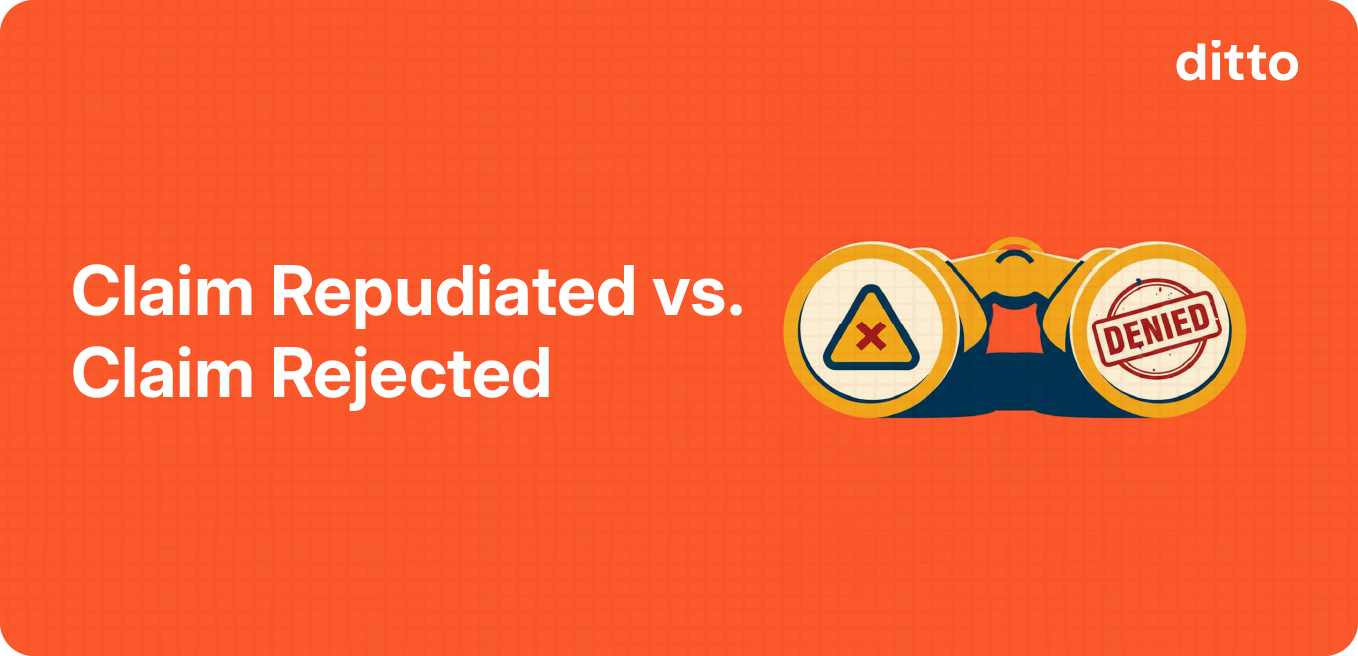CASE 1: Tintin undergoes knee replacement surgery. He is recovering, stress-free since he has a great health insurance policy that will surely offer coverage. Since his surgery was conducted in a non-network hospital, he pays off the hospital bill from his pocket first and then raises the claim. His health insurance provider reached back to him with a CLAIM REJECTED status.
CASE 2: Captain Haddock is a soldier in the Navy with an old injury from a war that has led to severe spine injury. He needed a spine correction surgery, but finances are not his concern. His health insurance plan will fund the treatment. He approaches a specialist for the surgery and while recovering, raises a claim. His claim status comes back as CLAIM REPUDIATED.
Now, in both these cases, health insurance providers do not offer coverage for the medical procedures undergone. But does this mean claim rejection and claim repudiation are the same? Are both of these claim settlement statuses, an ultimatum? Will understanding the differences help you avoid them and seek a solution to reverse them?
Reason to know more about this!
Why Was Your Claim Denied?
- The insurer goes through your claim and finds fraudulent documentation or history, or wrong data/information provided in the claim.
- Your claim gets repudiated with a high chance of legal cases filed against you and/or your healthcare provider.
- Your health insurer takes a look at your claim and finds that your claim has failed to meet the required criteria to avail of the funding due to claims raised during the waiting period, lack of proper documentation, etc.
- Your claim gets rejected leaving you room to rectify the errors in the provided data and reapply for the claim.
Heads Up: It takes an average person up to 5 hours to read & analyze a term life policy, and 10 hours or more to compare different plans and make a decision.
This is why we propose a better alternative - taking a 30-minute FREE consultation with Ditto’s certified advisors. We have a spam-free guarantee, and we’ll never push you to buy a plan. Don’t delay this - we have limited slots every day, so book a quick call here before they run out.
Health Insurance Claim Repudiation
What is Health Insurance Claim Repudiation?
Health insurance claim repudiation indicates a situation where -
STEP 1: You raise a claim,
STEP 2: Your reputed health insurance provider takes a close look at the claim.
STEP 3: Upon investigation, the insurer comes to the conclusion that the treatment is not covered under the assigned health insurance plan and that the insurer has no liability to offer coverage for the same (the reasons have been disclosed below).
Under these circumstances of health insurance claim repudiation, wherein the reasons are so grave, insurers can take serious legal actions against you, the policyholder.
Why are health insurance claims repudiated?
Health insurance claim repudiations often bear serious legal involvement. Considering the gravity of the circumstances, repudiation only happens in the most extreme cases -
- Fraudulent Activities - In case you, the policyholder or your healthcare provider is engaged in any fraudulent activities such as forging personal or medical documents, representation of falsified proof of medical procedures, etc. - your health insurance provider can and will repudiate your claim.
- Policy Exclusions - If you have filed a claim for a treatment that falls under any of the permanent exclusions listed in your health insurance policy document, then you are looking at a claim repudiation.
- Material Misrepresentation or Non-Disclosure of Relevant Information - Any failure to disclose past medical history, pre-existing medical conditions, or past treatments/procedures may result in the insurer declaring your claim as being repudiated.
- Policy Violations - If you violate the terms and conditions explicitly mentioned in the policy documents, and claim for any treatments after your health insurance plan has lapsed or has been terminated, you have to expect a claim repudiation.
- Policy Limits Exhausted - There is a reason why health insurance experts always advise you to take up unlimited restoration perks in your health insurance policy. In case, you have opted for low coverage or have a chronic ailment that requires frequent hospitalisation across a year and do not have the restoration perk, you are looking at an exhausted sum insured. Any claims raised during such times mean your health insurance provider will repudiate them.
Health Insurance Claim Rejection
What is Health Insurance Claim Rejection?
A health insurance policy rejection means that your provider has gone through your claim and found that the medical procedure/treatment for which you are seeking a claim, is not covered by your health insurance plan, as described in its policy outline. The claim raised does not meet the criteria or requirements for which the health insurer will offer coverage.
Why are health insurance claims rejected?
Health insurance claim rejections can result from -
- Delayed claim filing - With the best health insurance policies and the offering partners, there are terms and conditions associated with the window within which claims need to be filed. This window varies from one insurer to another and is also dependent on the mode of the claim raised - cashless or reimbursement.
If you miss out on this window, a health insurance claim rejection is a definite situation that you will have to face. - Lack of proper documentation - Each claim when filed, irrespective of whether it’s a cashless claim or a reimbursement one, needs to be submitted with a proper set of documentation including personal ID, policy number, medical details, hospital invoice, etc.
If you miss out on any one of the documents or provide the wrong one, your health insurance provider will reject your claim. - Claim falling outside policy coverage terms - Each health insurance plan comes with a set of exclusions. Some of these can be waived via health insurance add-ons, while others can’t. If your claim falls in the purview of the latter (permanent exclusions), your claim will be rejected by the health insurer.
Thus, it is crucial that once you have availed of a health insurance plan, you take a look at the mentioned exclusions and make a mental note of it. This will help you avoid any chances of claim rejection in the future. - With holding prior medical conditions - Say you have a pre-existing medical condition. The condition was treated and cured a year ago and so you decide not to disclose this to your health insurer. However, what if this ailment makes its come-back via an auxiliary condition after you avail of the plan?
Your insurer will surely reject the claim considering now they will be acquainted with your medical history and how you withheld the information. You end up shelling out substantially from your pocket despite having one of the best health insurance policies at your disposal. - Missed out on pre-authorisation requests - The treatment of certain ailments requires prior authorisation clearance from your health insurance provider.
If you have missed out on these details, and have undergone the medical procedure, then your claim will be rejected, despite your policy having a coverage bandwidth for it. - The claim was raised within the waiting period - Health insurance policies come with waiting periods that are applicable on the initial 30 days of the policy purchase, pre-existing ailments, specific diseases, chronic ailments, and maternity-related diseases.
During this time, insurers do not offer coverage for any respective ailments that you require treatment for. If you raise any claims during this time, your claims will be rejected.
What is the Difference between Claim Repudiated & Claim Rejected in Health Insurance?
What to do if your health insurance claim has been repudiated or rejected?
A repudiated/rejected claim indicates the chances of a grave legal criticality that would definitely leave a mark on your financial history. Now, considering how crucial health insurance policies are in safeguarding your finances during medical happenstances, you definitely don’t want this to happen. Avoiding any chances of your claim being repudiated/rejected is the very first step -
- Cross-check the details that you submit during the health insurance application and claim process.
- Check the terms and conditions mentioned in your policy document and avoid filing any claims for the exclusions.
- Make sure not to leave any health conditions undisclosed.
- Check your policy for any disease-wise sub-limits or waiting periods and file your claim time and amount accordingly.
- Opt for an unlimited restoration perk and/or Super Top-Up plans along with your base health insurance policy.
However, if your claim has already been repudiated, here’s what you need to do -
- First, try and figure out the “why”?
- If you fail to do so on your own, reach out to your insurer/Third Party Administrator (TPA) and enquire about the specific reason why your claim got repudiated.
- In case you find an issue with your documents or details, reach out to your insurer with the documents supporting the accurate data and file for a correction of this information.
- If your claim still doesn’t get accepted, approach an Ombudsman forum and follow up with the required procedure of filing a complaint, gathering legal counsel, etc.
Why Talk to Ditto for Your Health Insurance?
At Ditto, we’ve assisted over 8,00,000 customers with choosing the right insurance policy. Why customers like Abhinav below love us:

- No-Spam & No Salesmen
- Rated 4.9/5 on Google Reviews by 15,000+ happy customers
- Backed by Zerodha
- 100% Free Consultation
You can book a FREE consultation. Slots are running out, so make sure you book a call now!
Conclusion
The difference between health insurance policy claim rejection and repudiation is very minute. The entire difference lies in the reason and the consequences brought in by both of them. However, for both of them, you, the policyholder end up taking a substantial financial hit because despite having the cushioning of funding to help you during medical emergencies, you end up paying for the treatments out of your own pocket. The best way forward would be to be careful about the supporting documents, policy documents, and health insurance policies that you choose. In case you are facing a repudiation or rejection, you can also reach out to a health insurance expert to know about what to do next.
Last updated on:










